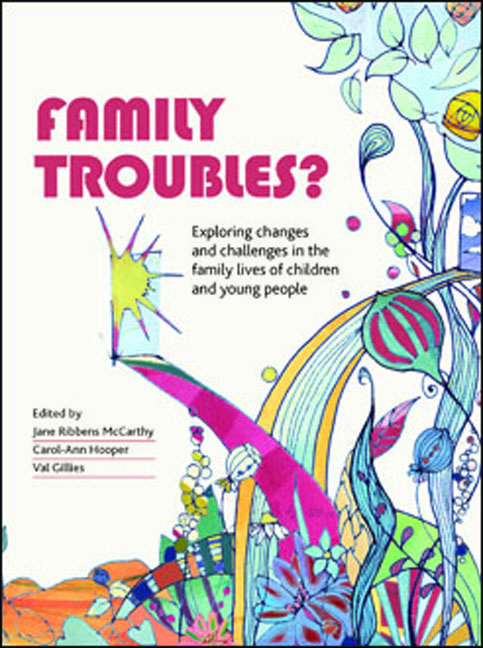Book contents
- Frontmatter
- Contents
- Notes on contributors
- Foreword
- Preface
- 1 Troubling normalities and normal family troubles: diversities, experiences and tensions
- Part One Approaching family troubles ? Contexts and methodologies :Introduction to Part One
- Part Two Whose trouble ? Conteste d definitions and practice: Introduction to Part Two
- Part Three The Normal, The Troubling And The Harmful?: Introduction to Part Three
- Part Four Troubles and transitions across space and culture: Introduction to Part Four
- Part Five Working With Families: Introduction to Part Five
- Index
9 - Children's non-conforming behaviour: personal trouble or public issue?
Published online by Cambridge University Press: 07 September 2022
- Frontmatter
- Contents
- Notes on contributors
- Foreword
- Preface
- 1 Troubling normalities and normal family troubles: diversities, experiences and tensions
- Part One Approaching family troubles ? Contexts and methodologies :Introduction to Part One
- Part Two Whose trouble ? Conteste d definitions and practice: Introduction to Part Two
- Part Three The Normal, The Troubling And The Harmful?: Introduction to Part Three
- Part Four Troubles and transitions across space and culture: Introduction to Part Four
- Part Five Working With Families: Introduction to Part Five
- Index
Summary
Introduction
In the UK, government policy increasingly seeks to define the meaning of ‘good’ parenting and to link responsible parenting with successful outcomes for children. This is just one of a number of powerful discourses which influence family life. Parents’ perceptions of their child when development or behaviour does not appear to conform to societal norms are influenced by the pervasive discourses of health, normality, childhood and, indeed, parenting. In this chapter, I explore how a subsection of parents makes sense of ‘difference’ in their child in comparison to other children, providing insight into how family troubles, such as children's challenging and non-conforming behaviour, become in some cases normalised and in others a matter for wider concern, often requiring intervention. Drawing on data from qualitative research into the experience of attention deficit hyperactivity disorder (ADHD) diagnosis, I illustrate how the behaviour of some children becomes differentiated from the norm and problematised through a process that is underpinned by the dominant biomedical model of health. There are, in turn, unforeseen implications when troubles within the family become troubles outside of the family. Reflection on the following tension is encouraged: biomedical diagnosis of emotional and behavioural difficulties (including ADHD) leads to children's behaviour being framed as a specific medical condition, which prompts specialist intervention, thereby rendering a somewhat private, family trouble as a more public issue (Mills, 1959). Simultaneously, a medical diagnosis can work to depoliticise troublesome behaviour so that it is regarded not as intrinsically related to the structure of the social system, but as an individualised problem (Zola, 1972; Conrad, 1976).
‘Medicalisation’ of non-conforming behaviour
The ways in which ‘problems’ become defined in medical terms, as an illness or a disorder requiring a medical intervention, have long concerned critics of medicine (Freidson, 1970; Zola, 1972; Conrad, 1975, 1976, 1992; for discussion, see also Ballard and Elston, 2005). The process by which children's behaviour becomes medicalised is greatly influenced by discourses of ‘health’, ‘normality’, ‘childhood’ and, indeed, parenting, with the construction of new medical categories often being heavily promoted by pharmaceutical companies and growing consumer power (Conrad, 1976). One of the consequences of the growth of medical knowledge in the 20th century was the proliferation of different types of ‘child’, differentiated into categories of perceptual difference from some notional model of the ‘normal’ child (Armstrong, 1983) and linked to an overriding concern with the health of the nation (Armstrong, 1995).
- Type
- Chapter
- Information
- Family Troubles?Exploring Changes and Challenges in the Family Lives of Children and Young People, pp. 107 - 118Publisher: Bristol University PressPrint publication year: 2013

